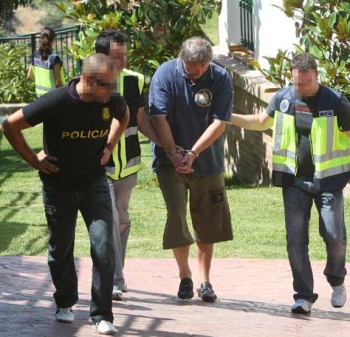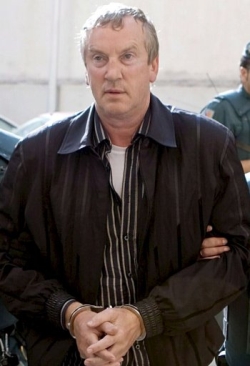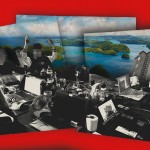 Alexander MalyshevPetrov and Malyshev and 13 others were indicted for establishing a criminal organization that oversaw a network of operations including smuggling, fraud, bribery, drug trafficking and contract killings.
Alexander MalyshevPetrov and Malyshev and 13 others were indicted for establishing a criminal organization that oversaw a network of operations including smuggling, fraud, bribery, drug trafficking and contract killings.
This was the largest indictment mentioning so many Russians, along with three Spanish jurists.
According to the indictment, Petrov, Malyshev and several others had moved from Russia and settled in Malaga, Levante and the Balearic Islands, where they operated.
The case is ongoing. Petrov, Malyshev and most of those indicted are still under arrest.
Baltasar Garson, a Spanish judge, wrote in the indictment that the group the men were involved with was the Tambovsko-Malyshevskaya group, and he pointed out a link between Petrov and Vladimir Kumarin (he changed his name to his mother’s maiden name, Barsukov), who was the leader of the Tambovskaya organized crime group. Barsukov was arrested in St. Petersburg in 2007 and was charged with planning murders, with arranging murders, and with the violent seizure of property. That case is still underway and some have suggested that it marks the end of the violent era of transition.
The Spanish indictment pointed out Petrov's role, whom it identified as a leading figure in the group and it mentioned that he and Sergey Kuzmin had, in the past, been arrested and in jail together. The indictment said they had founded several companies in Spain.
A look into the past and into the connections of these men shows an impressive network of contacts with politicians, public officials, heads of state controlled companies, friends of Vladimir Putin and businesses linked to some of his relatives.
To some, that came as no surprise. Alexander Kulikov, a member of the Russian parliament and a former officer in the anti-crime police division, said criminal groups and their leaders participated in the property redivision in Russia in the 1990s.
Some Historical Reasons
 Gennadiy PetrovThere were historical reasons for this, according to Georgiy Satarov, former assistant to Russian President Boris Yeltsin and now the head of the INDEM. Foundation and a researcher of corruption in Russia. He said the state in Soviet times made entrepreneurs illegal, and that led to the mixing of criminals with those who wanted to start businesses anyway. When business was legalized in Russia that mixture of people poured into the business leadership.
Gennadiy PetrovThere were historical reasons for this, according to Georgiy Satarov, former assistant to Russian President Boris Yeltsin and now the head of the INDEM. Foundation and a researcher of corruption in Russia. He said the state in Soviet times made entrepreneurs illegal, and that led to the mixing of criminals with those who wanted to start businesses anyway. When business was legalized in Russia that mixture of people poured into the business leadership.
The regulation of business and the role of the state in regulation were weak and sometimes criminals were the best at getting around regulations, and there was a period of mixing among businessmen, criminals, politicians and officials in the years after 1990, he said. So mobsters and the Russian elite knew each other.
They emerged nearly from one and the same circle, said Igor Yurgens, vice-president of the Russian Union of Manufacturers and Entrepreneurs.
The connections of Petrov, his relatives, and of Malyshev underscore that fact.
The key connection, perhaps, was “Russia” bank of St. Petersburg, which listed Petrov and Sergey Kuzmin as co-owners of the bank in 1998-1999. Among shareholders were close friends and associates of politicians, companies linked with high-profile individuals within the fabric of Russian society.
Yuri Kovaltchuk, a major shareholoder and head of the board, established a country-house cooperative “Ozero” with Putin in November 1996, and two other shareholders were co-founders of “Ozero.”
Later, “Russia” bank gained control over SOGAS, one of the biggest Russian insurance company, taken from Gasprom and became the biggest shareholder of “Dershavni” that united shares of more than 90 russian enterprises. It also became a main owner of “National Mediagroup,” which owns two TV channels and Russia’s “Izvestia” newspaper.
Links to Putin Relatives
Threads from the intricate web of ownership and interests went to the son of Vladimir Putin’s cousin—Mikhail Shelomov, and another Putin cousin’s son, Mikhail Putin, who became the deputy chairman in SOGAS in 2007 after he worked for Gasprom.
And another son—this one Petrov’s—was also linked with “Russia” bank and with “Baltic Monolith,” which, with more than 200 employees, establishes elite real estate projects in Moscow, St. Petersurg and Sochi. Anton Petrov,28, the son, and Olga Solovyeva -- who was indicted in Spain with the elder Petrov-- founded “Capital Plus,” one in another network of interlocking ownerships and interests. It had, at one time, connections to the empire of Oleg Deripaska, the 10th wealthiest Russian, with $3.5 billion, according to Forbes Magzine’s 2009 list of the wealthy. They were also connected to the “Baltic Construction Company” of Igor Naivalt.
Naivalt has connections to Putin’s friends and realtives. “Russia” bank was among the shareholders of Naivalt’s “Baltic Construction Company” branch in St. Petersburg until February 2005. And the son of Putin’s cousin Michail Shelomov was a co-founder of ”Baltic Construction Company-65,” one of many divisions of Naivalt’s company.
Andrey Shumkov was on the bank’s board of directors from 1998 to 2000. Investors in the bank included a dizzying array of companies, including Ergen, Fuel Investment Company and Forward Limited, companies linked to Shumkov. Ergen was owned by Shumkov and Kuzmin. Fuel Investment was owned by companies affiliated with Kuzmin and Petrov, according to the Russian business newspaper, Vedomosti.
Enterprises that involve Shumkov, Petrov and Malyshev extend to real estate, chemistry and fuel. Petrov and his son were acquainted with some people who became heads of Russian state-controlled companies.
Shumkov could not be reached for comment, and no one from “Russia” bank, or Petrov’s son and his partner, or Igor Naivalt responded to requests for interviews.
But a friend of Gennadiy Petrov said that Petrov’s health is not good. The friend, who refused to give his name because he is working for state controlled company and did not want to acknowledge the acquaintance publicly, said that he thought Petrov would give back everything, if everybody would forget about his past. He said that Petrov had moved and wanted to live without attracting attention, “but special forces and helicopters were sent to arrest him.”
Why such a network of ties that involve both the elite and those who come from the shadowy world of the Russian underground? Igor Yurgens, vice-president of the Russian Union of Manufacturers and Entrepreneurs had some thoughts. “Certainly in the time of transformations, nearly everybody passed through the ‘school of mud.’ ”
--Roman Shleynov,
Investigations Editor,
Novaya Gazeta, Moscow
(Novaya Gazeta is an OCCRP partner and Shleynov is a member of the OCCRP team)
Relative Wealth in Russia
Vladimir Putin has always denied having any serious wealth. But one of his relatives somehow amassed as much as $573 million...





